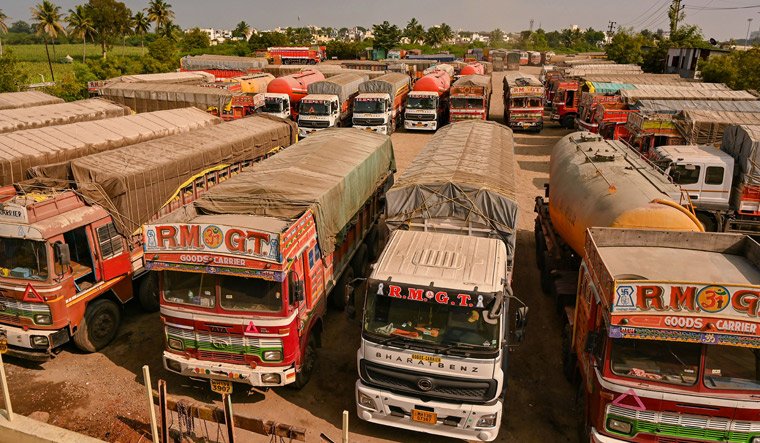Karnataka truck drivers have commenced an indefinite strike starting January 17, protesting against the new hit-and-run law proposed under the Bharatiya Nyaya Sanhita. This law, set to replace the Indian Penal Code, suggests severe penalties for drivers causing significant accidents through negligent driving and fleeing the scene without informing authorities. Under the new provisions, such drivers could face up to 10 years in prison or a fine of ₹7 lakh. This marks a substantial increase from the earlier punishment of two years specified in the British-era Indian Penal Code (IPC).
The truckers’ strike is not isolated to Karnataka, as earlier this month, similar protests erupted in multiple states, including Maharashtra, Punjab, Madhya Pradesh, Uttar Pradesh, Himachal Pradesh, and others. The proposed changes have sparked widespread discontent among truck drivers and transport associations across the country.
C. Naveen Reddy, the President of the Federation of Karnataka Lorry Owners’ Association, expressed dissatisfaction with the unilateral decision by the union government. Despite calls for discussions, Reddy claimed that officials did not provide any written assurances to address concerns raised by the trucking community. He labeled the decision as hasty and emphasized the lack of consultation with stakeholders before finalizing the new law.
“We already informed all the truck drivers in the state, and we will be going on a strike. All heavy vehicles will go off-road from January 17,” stated Reddy, underlining the unanimous decision to withdraw services until their grievances are addressed.
The new hit-and-run law has led to disruptions in the transportation sector, impacting fuel supplies and causing panic-buying at fuel stations. Additionally, the slowdown in truck movements has affected the supply chain, leading to concerns about essential commodities’ availability in various regions. Massive queues were witnessed at fuel stations, and traders reported a 10-15% rise in vegetable prices in Delhi due to supply chain disruptions.
The protests by truck drivers highlight the broader challenges faced by the transportation industry, where stringent regulations and sudden policy changes can have cascading effects on logistics, commerce, and daily life. The All India Motor Transport Association (AIMTC) had earlier led nationwide protests against the new hit-and-run law. After a meeting with Union Home Secretary Ajay Bhalla on January 2, AIMTC decided to temporarily halt the protests.
During the meeting, the government assured AIMTC members that the new laws had not been implemented yet and emphasized the need for consultations before their enforcement. The decision to suspend the protests reflected a tentative truce between the government and transport associations. However, with the initiation of a fresh strike in Karnataka, tensions have reignited, and the trucking community’s concerns continue to be a focal point of discussion.
The trucking industry plays a pivotal role in the country’s economic ecosystem, facilitating the movement of goods and ensuring the supply of essential commodities. Any disruptions in this sector can have immediate and far-reaching consequences, affecting businesses, consumers, and the overall functioning of the economy.
As the strike unfolds in Karnataka, it draws attention to the need for comprehensive dialogues between the government and stakeholders in the transportation sector. Balancing road safety concerns with the practical challenges faced by truckers requires a nuanced approach that considers the diverse perspectives within the industry.
The ongoing protests underscore the importance of collaborative decision-making processes, where the concerns of truck drivers are taken into account while formulating and implementing policies related to road safety and transportation. Striking a balance between stringent regulations and the operational realities faced by the trucking community is crucial for maintaining the smooth functioning of the transportation network and ensuring the timely delivery of goods across the country.
